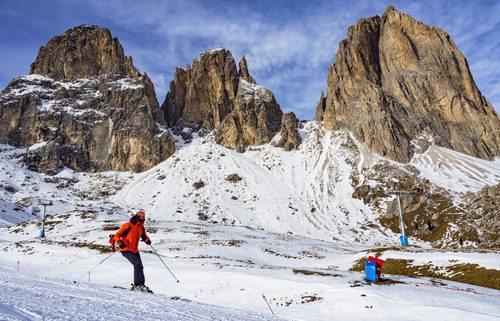Skiing and Back Pain
As heavy snow is covering mountaintops, many of us will be hitting the slopes this season. For some people, however, this much-loved activity can flare up previous and current injuries. Downhill skiing and snowboarding can result in both serious and minor injuries if you are not prepared. Skiers and snowboarders often require specific conditioning and workout routines not only to perform better and prevent fatigue, but also to reduce the risk of injury on the slopes. Strength, flexibility, endurance, and agility drills for skiers and boarders are all essential for recreational and expert skiers. Most skiers return to the slopes after months, if not years, away. While some athletes participate in other sports during the off-season to stay in shape, many are weekend warriors. No matter how experienced a skier you are, you could wind up with minor aches, pains, or even a serious injury if you do not spend some time preparing for this demanding sport.
So here are a few things to be aware of that will help you avoid unnecessary injuries:
- Exercise: Begin exercising to prep for the skiing season at least 6 weeks before your trip. You will have a lot more fun on the slopes if you are in good shape.
- Get your heart pumping: Cycling gives an excellent cardiovascular workout and strengthens those important leg muscles.
- Core work: Remember to work on your stomach and back muscles. Abdominal crunches, plank exercises, and low back extensions will improve your posture and balance when skiing, not to mention support your spine.
- It’s a balancing act: Balance is an important factor in skiing. Use a wobble board to improve balance and build up ankle muscles. Rocking heel to toe is good for boarders while left to right is best for skiers.
- Check it out: Most skiers and boarders find turning one way easier than the other. Poor technique might not be the problem here; in fact, muscle and joint alignment could be causing this. Visit us to sort out any spinal joint dysfunction and improve performance.
- Respect your limits: Ski on slopes that fit your ability level. Do not ski trails that are above your skill level. Trails will be clearly marked to note what level they are appropriate for. On a similar note, stay in control of your skis and focus on the trail you are skiing. Accidents happen more often when you are distracted.
If you have a back problem on the slope, consider taking lessons from a ski instructor who has experience in teaching individuals with back pain.
Unresolved joint and muscle problems are a sure way to increase your risk of injury. Be sure to consult your doctor before the trip so that your trip is free of pain and injury. All it takes is a bit of care, attention, and common sense to avoid traumas. Remember, pain is a warning – do not ignore it.
Interventional Physicians of Indiana is a leading provider of leg, back pain treatments, relief for acute or chronic pain since 2003. Serving the greater Indianapolis, IN area including Carmel, Westfield, Fishers, Noblesville, Geist, Broad Ripple and Castleton.



